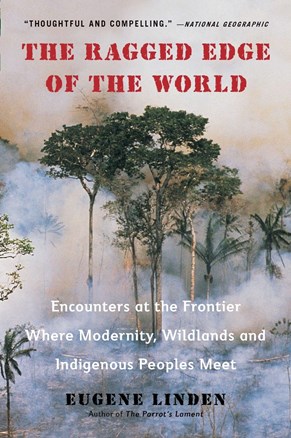Description
A pioneering work of environmental journalism that vividly depicts the people, animals and landscapes on the front lines of change's inexorable march.
A species nearing extinction, a tribe losing centuries of knowledge, a tract of forest facing the first incursion of humans-how can we even begin to assess the cost of losing so much of our natural and cultural legacy?
For forty years, environmental journalist and author Eugene Linden has traveled to the very sites where tradition, wildlands and the various forces of modernity collide. In The Ragged Edge of the World, he takes us from pygmy forests to the Antarctic to the world's most pristine rainforest in the Congo to tell the story of the harm taking place-and the successful preservation efforts-in the world's last wild places.
The Ragged Edge of the World is a critical favorite, and was an editors' pick on Oprah.com.
About the Author
I've spent my entire writing career exploring various aspects of one question: Why is it that after hundreds of thousands of years one relatively small subset of our species has reached a point where its fears, appetites, and spending habits control the destiny of every culture, every major ecosystem, and virtually every creature on earth? What happened that enabled us to seize control in a blink of an eye?I began scratching at this question in my first book, Apes, Men and Language, published over 40 years ago. In that book I explored the implications of some experiments from the 1960s that showed that chimpanzees could use sign language in ways similar to the way we use words - to express opinions and feelings, to make specific requests, and to comment on the events of their day. Since the moral basis of our rights to use nature as so much raw material is deeply entangled with the belief that we are the lone sentient beings on the planet, I wondered what it would mean if it turned out that other animals possessed higher mental abilities and consciousness? I never expected that the scientific establishment and society would say "oops, sorry," but I also never imagined that the issue would turn out to be as fraught and contentious as it has.That first book was the result of a curious turn of events. My first major journalistic assignment was an investigation of fragging (attacks by enlisted men on their officers) in Vietnam. That article, "The Demoralization of an Army: Fragging and Other Withdrawal Symptoms," was published as a cover story in Saturday Review in 1971. It got a good deal of attention, and a few publishers contacted me about possibly writing a book. I was eager to do that, but a few publishers lost interest when they learned that I wanted to write about experiments teaching sign language to apes and not Vietnam. Dutton gamely stayed on, however, and "Apes" is still in print in some parts of the world.Since that first book, I've revisited and explored animal thinking in several books and many articles. In Silent Partners: The Legacy of the Ape Language Experiments, I looked at what happened to the animals themselves in the aftermath of the experiments as the chimps were whipsawed by a society that shifted back and forth between treating them as personalities and commodities. I wrote articles for National Geographic, TIME, and Parade, among other publications about animal intelligence as the debate progressed at its glacial pace.Then, in the 1990s, I had an epiphany of sorts. I'd heard a story about an orangutan that got hold of a piece of wire and used it to pick the lock on his cage, all the while hiding his efforts from the zookeepers. Here seemed to be a panoply of higher mental abilities on display, unprompted by any rewards from humans, and it occurred to me that, if animals could think, maybe they did their best thinking when it served their purposes, and not some human in a lab coat. Out of this flash came two more books, The Parrot's Lament: Tales of Animal Intrigue, Intelligence and Ingenuity, and, The Octopus and the Orangutan: More Tales of Animal Intrigue, Intelligence, and Ingenuity, as well as a few more articles for TIME, Parade, and Oprah among other publications. I've found this approach to thinking about animal intelligence both liberating and fun, and I intend to explore this a good deal more.The question of what makes us different than other creatures was but one aspect of my career-long efforts to understand how we have come to rule the planet. At the same time that I was exploring the question of higher mental abilities in animals I also began to think about how our notions our notions of our own specialness related to the consumer society. If intelligence, language and consciousness gave us dominion, it was the consumer society that gave us the tools to exploit nature for our own benefit. I've developed my thoughts on the nature and origins of consumer societies in four b
